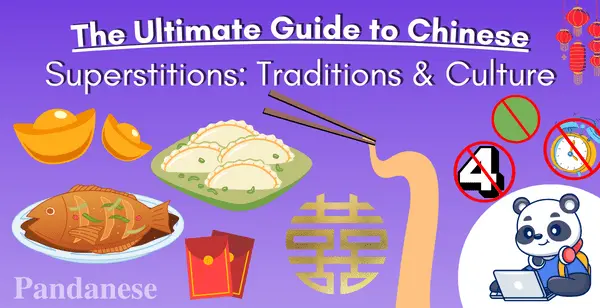
A Walk Through Chinese Superstitions: Numbers, Colors, and Customs
Growing up in a Chinese household, I was no stranger to the whimsical rituals and beliefs that governed everyday life. I vividly recall my grandmother insisting that we never gift a clock to anyone, as it was considered a symbol of saying goodbye. Or how my family would meticulously avoid the number 4, as it sounded too close to the word for death.
These practices weren't just quirks or old wives' tales to us; they were part of a broader tapestry of Chinese superstitions that I later learned were shared by many Chinese people. Chinese people have always been guided by traditions and customs deeply rooted in our culture, weaving together the fabric of our daily lives.
Whether it's the allure of lucky numbers, the vibrancy of auspicious colors, or time-honored customs linked to weddings and the New Year, these superstitions are more than fascinating quirks—they're integral parts of what makes our culture unique and rich. I'll guide you through the must-knows and some less-known Chinese superstitions in this article.
Numbers in Chinese superstitions
An essential part of Chinese superstitions, revolves around numbers. Their significance can be seen in license plate numbers, floor numbers in buildings, phone numbers, and even in the prices of goods.

Certain numbers are considered lucky, while others bring about misfortune.
For instance, the number 8, is one of the lucky numbers in Chinese culture as it sounds similar to the Chinese word for 'wealth' or 'prosper.' This reasoning is why many buildings, especially high-end apartments, and offices, have an 8th, 18th, or 28th floor but not a 4th or 14th one.
On the other hand, 4 is a very unlucky number because it sounds like the word for death in Chinese. So much so that many buildings in China do not have a fourth floor, similar to how some Western buildings avoid having a 13th floor. Chinese superstition goes a step further with the number 14 considered very bad luck because it sounds like 'sure to die' in Chinese.
Numbers in Chinese superstitions are not limited to architecture. For instance, when giving money as a gift, it is often given in even amounts for good fortune, except for the number 4.
Colors in Chinese superstitions
Just like numbers, colors also have their place in Chinese superstitions.
Red for prosperity and celebrations
Red, for example, is a lucky color in China, symbolizing good luck, happiness, and prosperity.

Lunar New Year red envelopes | The Seattle Times
It is common to wear red during important celebrations like weddings and the Chinese New Year. Many Chinese superstitions also regard the giving and receiving red envelopes filled with money for luck.
White and black as symbols of mourning
In sharp contrast to the warmth of red, white and black are considered unlucky colors in Chinese culture. Traditionally associated with death and mourning, these colors are generally avoided during happy occasions.
White is often worn at funerals, and using it in a celebratory context is considered bad luck.
Green is the cultural taboo
Green is another color that comes with caution, especially for Chinese men. The phrase "wearing a green hat" sounds similar to a term for a cuckold in Chinese, making green hats a big no-no in Chinese culture.
This association has turned wearing a green hat into a symbol of infidelity, becoming one of the unique color-related superstitions in Chinese society.
Chinese wedding superstitions
Wedding ceremonies in China are steeped in tradition and involve a host of Chinese superstitions aimed at ensuring a happy and prosperous marriage.
The symbol of "double happiness"
A common sight at Chinese weddings, the symbol known as "double happiness" is often prominently displayed on a bright red banner at the entrance of the wedding venue. This character isn't just for decoration; it's a powerful symbol to attract positive energy and bless the newlyweds with joy.

Double Happiness calligraphy symbol
Long noodles, long life
Longevity noodles | The Woks of Life
The wedding feast itself is subject to certain beliefs. Serving long noodles is a must, as they symbolize long life and are considered to be good luck.
The longer the noodles, the better, so don't cut them short!
Avoiding sharp objects
Gift-giving at Chinese weddings is a careful affair. Sharp objects like scissors or knives are considered bad luck, symbolizing the severing of relationships.
Giving these as gifts is taboo, and everyone avoids them, focusing on more harmonious offerings instead.
Chinese New Year superstitions
One of the biggest festivals in China, Chinese New Year or the Spring Festival, has numerous Chinese superstitions that come into play.
Cleaning rituals
In the days leading up to Chinese New Year, homes are meticulously cleaned, an act believed to sweep away any lingering bad luck from the previous year. This annual "spring cleaning" is more than a simple household chore; it symbolizes a fresh start and a clean slate.
However, the brooms and dusters must be put away once the clock strikes midnight. Sweeping or cleaning on New Year's Day itself is a strict taboo. The belief goes that you might accidentally sweep away the newly arrived good luck, setting an undesirable tone for the rest of the year.
Feasting with purpose
The Chinese New Year's feast isn't just about indulgence; it's a meal imbued with symbolism and intention. Certain foods are considered auspicious and essential, each carrying its unique meaning.

Lunar New Year dishes | Bon Appétit
There a couple of Chinese New Year food symbols that you have to know about:
Serving a whole fish is more than a culinary preference; it's a deliberate act to promote family unity and increase prosperity. The Chinese word for fish, "yu," sounds similar to the word for surplus, reflecting the hope for abundance in the coming year.
Additionally, dumplings are shaped like ancient Chinese gold ingots, so they are a must-have for those seeking good fortune and luck. Eating dumplings during the New Year is considered lucky, a delightful and tasty tradition embraced by young and old alike.
Chinese gift-giving superstitions
Regarding gift-giving, Chinese superstitions can seem pretty crazy to those unfamiliar with the culture. For example, clocks and umbrellas are considered inappropriate gifts, as their Chinese names sound similar to words for 'end' and 'separate,' respectively.
Even the simple act of giving a gift can bring bad luck if not done correctly. Gifts should be given and received with both hands, and it is customary to refuse a gift three times before finally accepting it.
Furthermore, despite being a common household item, a rice bowl should not be gifted as it sounds like the word for 'separation.' Instead, giving oranges is considered good luck as it sounds like the word for 'wealth.'
Other essential Chinese superstitions and symbols
1. Feng Shui: an ancient wisdom for modern life
Feng Shui, an essential part of traditional Chinese superstitions, is a system of arranging the living environment for optimal energy flow. For instance, it is believed that a bed should not face the door as it allows good energy to escape. Moreover, a mirror should not face the bed as it is thought to attract unwanted spirits.
Even the direction of your home matters in Feng Shui. The north represents darkness and is associated with bad luck. Therefore, homes are often oriented towards the south for good fortune.
2. The Chinese Zodiac: symbols of fortune
The Chinese Zodiac, a cycle of twelve animal signs, plays a crucial role in Chinese superstitions. Each year is associated with a specific animal, and people born in a certain year are believed to embody the animal's traits.
The Dragon, the only mythical creature in the zodiac, is considered the most auspicious sign. On the other hand, the Snake is seen as wise and enigmatic in Chinese culture, a different perception from the West.
Frequently asked questions
How are Chinese superstitions reflected in modern Chinese architecture?
Chinese superstitions significantly influence the design and architecture of both residential and commercial buildings. For instance, the number 4, considered unlucky, is often omitted in floor numbering.
In many buildings, the 4th floor is either nonexistent or renamed. Feng Shui principles are also integrated into architectural design. South-facing homes are more desirable as the north represents darkness and is associated with bad luck.
What are some superstitions related to babies and childbirth in Chinese culture?
There are numerous Chinese superstitions concerning babies and childbirth. One common belief is that babies should not be directly complimented as it might attract evil spirits or cause jealousy. Instead, it's common to use indirect compliments.
Another superstition dictates that expectant new mothers' should avoid attending funerals or weddings to avoid 'conflicting' energies. Furthermore, the Chinese zodiac is often consulted for auspicious birth dates, and certain zodiac years, like the Dragon, are deemed more favorable.
Can Chinese superstitions influence business decisions in China?
Yes, Chinese superstitions often have a strong impact on business decisions. For instance, selecting certain dates for product launches or business openings is commonly made based on the Chinese lunar calendar. Using lucky numbers in pricing and avoiding unlucky numbers is also prevalent.
Feng Shui principles often influence the layout and design of offices to attract positive energy and prosperity. Even business negotiations consider these superstitions, such as avoiding the gifting of sharp objects as they symbolize conflict or 'cutting ties.'
Still curious about some other Chinese superstitions? Check out this video here:
Questions and explanations of Chinese superstitions | Viking River CruisesConclusion
While Chinese superstitions may seem peculiar to those from different cultures, they play an integral part in Chinese society, influencing many aspects of daily life. They provide insights into the worldview of Chinese people, reflecting their values and beliefs.
Whether lucky numbers, auspicious colors, or wedding and New Year customs, these many superstitions, steeped in tradition and rich symbolism, add a layer of fascination to the multifaceted Chinese culture.
Jing You is a Chinese native who grew up in the Fujian province and soaked in the Chinese culture while living with her grandparents. She later moved to Singapore to pursue further education. However, she has always been passionate about the Mandarin language despite being in an environment that speaks English predominantly. She was involved in multiple Mandarin and Chinese culture programmes in schools, and brought this passion forward by tutoring elementary school students Mandarin in her adulthood.
The easiest way to learn Chinese & build vocabulary

